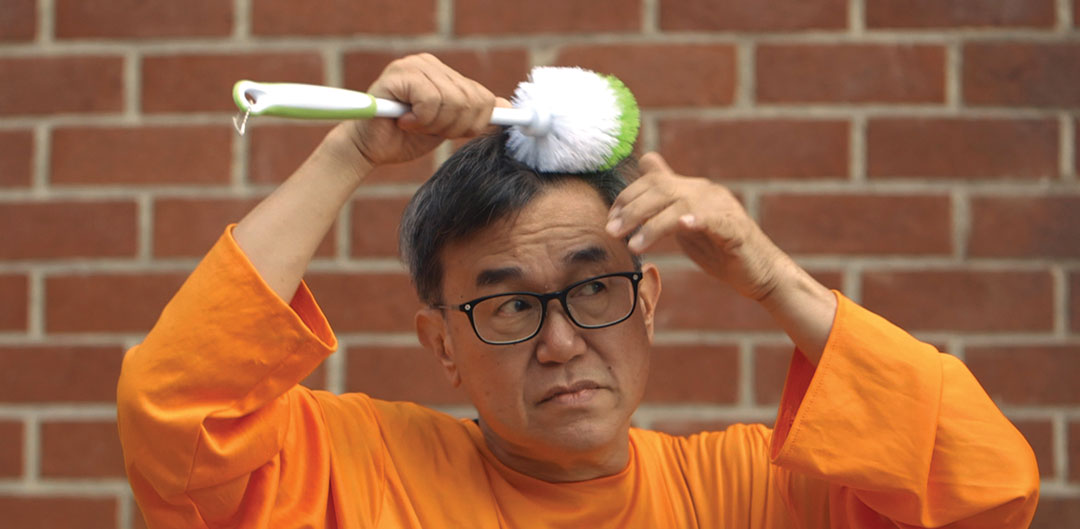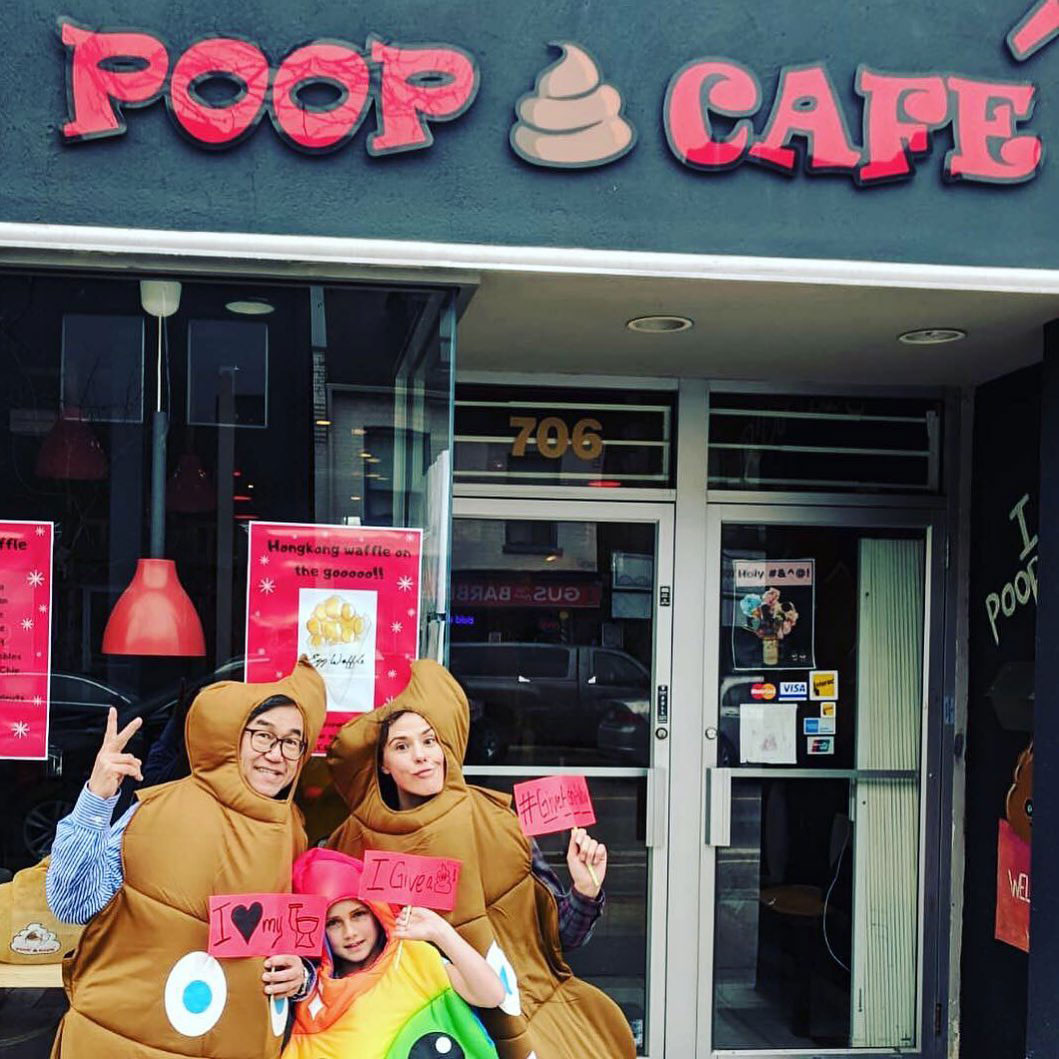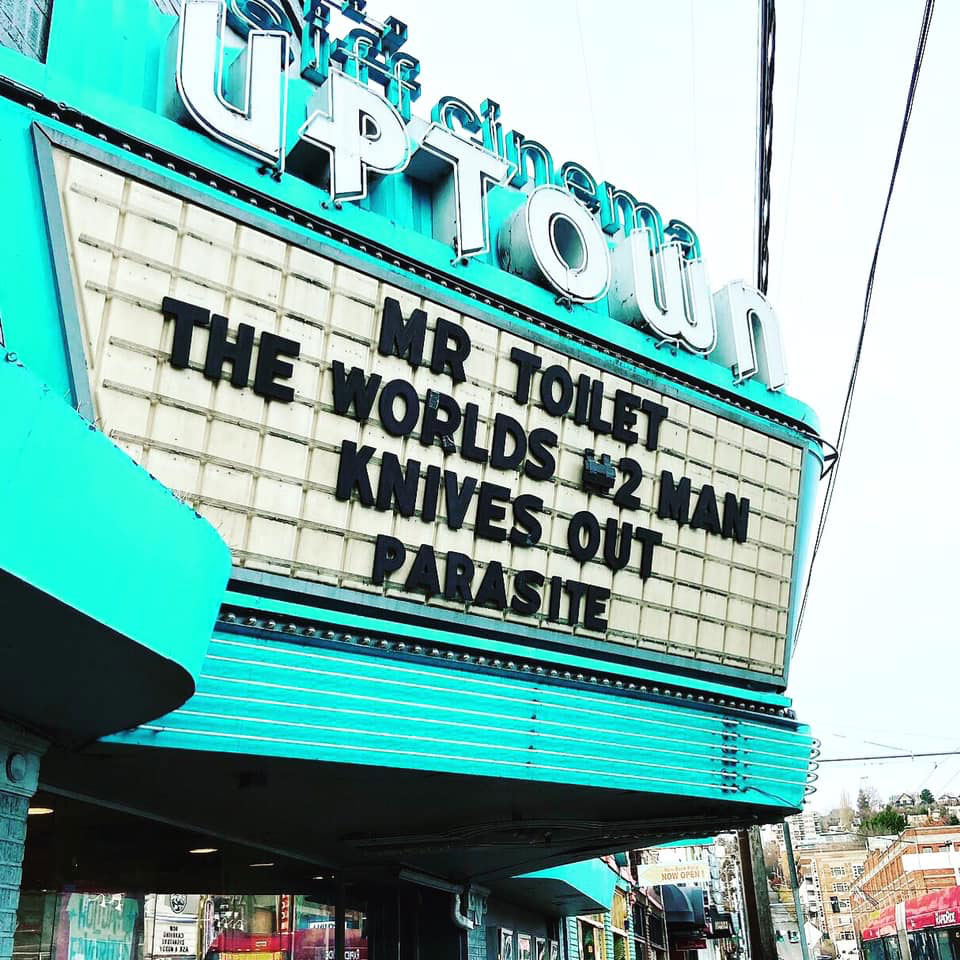
Talking Sh*t with the team behind Mr. Toilet: The World’s #2 Man
May 29, 2020

Shit happens. Literally. The fact that we can even talk about it figuratively is a privilege those who are reading this probably too often take for granted. The lack of sanitation has long been a global crisis, and the team behind the feature documentary, Mr. Toilet: The World’s #2 Man, embarked on making a movie to bring attention to this topic by approaching it with light-hearted humor. In other words, to figuratively take the piss out of literal shit. Having gone through both our Fiscal Sponsorship and Film Festival Distribution programs, Mr. Toilet was one of our top choices for a case study, so without further ado, let’s do our business…er…get down to business:
Director Lily Zepeda felt that Mr. Toilet’s (given name: Jack Sim) fearless humor and disregard for cultural norms was the magic potion for a character-based film. Nobody was willing to talk shit like Mr. Toilet, and humor was the way Lily felt most comfortable expressing herself. Also, as she dug deeper into the details of the sanitation crisis, she was struck by such shocking statistics. Not only does lack of sanitation affect 2.4 billion people, but it is women who suffer the most. They are at risk of rape when they go out in the open, and girls often do not go to school past menstruation age because they have no privacy. That was a huge motivator in making sure this story got told.
Mr. Toilet: The World’s #2 Man was Lily Zepeda’s directorial debut, and it took over five years to produce. It was shot in 4 countries and in 4 languages. She has a degree in journalism and has also worked in TV production and marketing, so storytelling has been part of her life for over 15 years.
Tchavdar Georgiev, the film’s producer/writer is an award-winning editor, director, and producer, whose works have premiered at major festivals, and have been seen on platforms such as HBO, BBC, Netflix, and PBS. These include the two-time Emmy nominated HBO documentary Valentine Road as well as Finders Keepers (Cinema Eye Honors Award), both of which premiered at Sundance. He also edited the Netflix Original The American Meme, which premiered at Tribeca and Hot Docs, and wrote, co-produced, and edited Off The Rails, which premiered at Hot Docs.
The filmmakers’ number one goal for making MR. TOILET was to build awareness about a taboo topic through humor, and reach a wider audience beyond the sanitation, water, and health sectors, who are already fully aware of the gravity of the crisis. The second goal was to leverage this film as an educational and advocacy tool, either in schools or alongside water & sanitation programs.
The ultimate dream was (and still is going forward) a streaming platform such as Amazon or Netflix, or a broadcast deal, such as with National Geographic, so that this crisis, which affects 1/3 of the world’s population, could have wider exposure. Their humorous take on an unmentionable topic blended with an eccentric character felt like a good fit for a broad audience.
The second goal was getting this film into environmental, global studies, or social studies classes at universities and high schools. MR. TOILET: The World’s #2 Man won the Docs for Schools Audience Award at Hot Docs in Toronto, which resulted in the creation of a teacher’s guide to use along with the film in classrooms.
A third goal was for Jack Sim’s organization, the World Toilet Organization, to use this film to elevate their exposure and support. The festival tour and theatrical release prompted many inspired audience members to offer their skills or time to volunteer.

Festival Premiere
We started to think about distribution after conducting our first pitches at film festivals, and, once we clearly formulated that this would not be an issue-driven film but a character-driven story, we immediately started a more detailed strategy, which included premiering at a top festival.
We applied to all the major festivals like Sundance, SXSW, and Tribeca first. Through our contacts, we made sure the programmers at the festivals knew about the film and were reviewing it for consideration. Hot Docs was the first large festival to express excitement about the story and we decided to go with them.
We wanted to premiere at a major, recognized film festival (that preferably included a market) so that we could ride the momentum and meet distributors who would be interested in the film. To that end, we met with multiple broadcasters and distributors at Hot Docs and ultimately sold the film to one of them. Our attendance at the prior year’s edition of the festival helped us in that some distributors and broadcasters were already familiar with the film when we pitched them after the premiere.
We premiered at Hot Docs on Apr 27, 2019. It was a very well-organized festival that catered to all the needs of the filmmaker. Loving and caring audiences.
Marketing, Publicity, Social Media at the World Premiere
We hired Ingrid Hamilton, a prominent Toronto-based publicist, to help make our premiere a splash. We also notified our own immediate filmmaking community and partner organizations. We pre-planned and created our daily social media and weekly email blasts, and flew Mr. Toilet to the premiere from Singapore along with our whole team from Los Angeles—producer, editors, and executive producers. Mr. Toilet already had a large following on social media so his “shares” helped to spread awareness and led to additional interviews.
Regarding our publicist, Ingrid Hamilton, she and her whole team at GAT PR worked non-stop a month and half before our premiere, as well as during the festival, to set up interviews with news outlets, film reviewers, podcasters, radio hosts, and TV shows. Mr. Toilet and Lily were interviewed on CTV, Canada’s leading News station, as well as Sirius XM Canada, CBC Radio, and Breakfast TV Toronto, as well as having a special feature in POV’s newsletter, and multiple podcasts and newspaper outlets. These interviews were significant contributors to the successful initial exposure and launch of the film.
The film was also a Staff Pick by the head programmer of Hot Docs, which was announced at the festival press conference, and we won the Docs for Schools Audience Award. Before the premiere, our film team also notified our film community, and partnering organizations such as Chicken & Egg Pictures, International Documentary Association, and World Toilet Organization to help encourage additional press coverage and social media shares. In a fun grassroots effort, Mr. Toilet and Lily also ran around the streets of Toronto dressed in poo costumes for a day to hand out postcards, take selfies, visit the Poop Café in Toronto, a toilet-themed café, and tell locals about the film.

The Search for a Distributor
Lily and Producer Tchavdar booked a spot at the Hot Docs Meet Market, which allows filmmakers to secure 20-minute meetings with interested broadcasters or distributors. We also reached out to agents and distributors with whom we did not initially get a meeting, so that we could set aside separate times during our visit to meet. Tchavdar utilized some of his contacts from previous films to gain interest from buyers or ask for intros. We also had a few platforms, such as Netflix, reach out us right after the press announcements were made (which was before the festival).
Producer Tchavdar had a long-standing relationship with The Film Collaborative, who was very helpful with the release of his film The Desert of Forbidden Art, and also the film he edited, Valentine Road. The Film Collaborative was brought on early in the game to advise us on how best to handle distribution. TFC’s founder Orly Ravid, also an attorney at Mitchell Silberberg & Knupp LLP, served as legal counsel for the film.
We licensed educational rights for North America to Grasshopper Films. All domestic and international broadcast, VOD, and streaming rights were given to Kew Media Group, while we retained the theatrical rights in North America. Unfortunately, Kew went bankrupt, but we were luckily able to transfer those rights in March 2020 to Journeyman Pictures, who will be working on our behalf for future sales.
The back-story of how all this happened was that in April 2019, we met with Nikolas Bars of Kew Media at Hot Docs. After we left Toronto, we furthered the discussions with him by including him in many conversations with our distribution lawyer, Orly Ravid. Journeyman Pictures, another distributor in Europe, had also reached out, and was interested in securing the film just before Hot Docs.
However, we made the choice to work with Kew Media for a few reasons: 1) they seemed to have strong relationships with both U.S. and international markets; 2) their slate contained a handful of recognizable films; and 3) they offered a higher minimum guarantee (MG) than Journeyman. Unfortunately, in early 2020, we found out that Kew Media had fallen into debt and collapsed, leaving many filmmakers, including us, unsure if payments from previous distribution deals were going to be made. They had sold a 47-minute cut of our film to Aljazeera English for non-exclusive worldwide rights (excluding the U.S.), starting on November 19,, 2019. We eventually re-obtained these rights from Kew Media and signed with Journeyman, who still feels very confident about VOD options for the film, especially during this coronavirus pandemic, where millions more people are at home consuming content.
Theatrical
After the April 2019 premiere, it was important for us to plan a theatrical release around November 19—World Toilet Day. This UN Holiday was adopted by 193 countries in 2013 and is an especially important day in New York. Many cities and organizations around the world use it as an opportunity to host events or post humorous and informative content about the toilet.
Our team raised an additional $40K from our two top investors to pay for a one-week theatrical release in Los Angeles and New York, which included funds for the following: 4-walling theaters, a theater booker, travel (with Mr. Toilet), advertising, hiring a publicist, and an outreach assistant coordinator. We hired Publicist Sasha Berman of Shotwell Media a few months before the release. She secured many podcasts, television and publication interviews and reviews, including: The Daily Beast, the Los Angeles Times, the New York Times, BBC radio, Women in Hollywood and KTLA (Los Angeles’s local morning news).
For advertisements, we focused on social media ads (Facebook) and a targeted email blast by the International Documentary Association. Most of these ads were launched in the two weeks leading up to the theatrical releases.
We were also featured on the Kickstarter events page and e-blast. Lily and an outreach assistant focused their efforts on schools located near the theaters, as well as major water & sanitation organizations with large social media platforms, documentary film communities, companies with toilet-related products, and Mr. Toilet’s (Jack Sim’s) immediate communities and partners. Many of these organizations or schools gathered groups to attend the film or supported us by posting about the film the week of the release. Jim Browne, a theater booker, was hired 2.5 months before the theatrical release to help us secure theaters in both in New York and Los Angeles. We secured the Village East Cinema in New York for $10.5K, and the Laemmle Monica Film Center Santa Monica for $6K. We generated about $2,963 in tickets sales in Los Angeles and $2,724 in New York.
Lily also secured partnerships with Tushy (bidets) & Poopurri (toilet spray). Both provided free product for the day of release of the film in each city, and Poopouri also donated 100 film tickets the United Nations School in New York. This offered a fun and engaging way to interact with audiences, and spark interest and shares on social media.
Additionally, during the weekend of the Los Angeles theatrical, we partnered with the Boys & Girls Club of Santa Monica and the Kohler Company for a toilet art display at the Santa Monica Promenade, a busy outdoor mall that is located two blocks from the theater showing the film. The kids at the local Boys & Girls Club decorated the Kohler-donated toilets and displayed them on a stage along with our movie posters at the Promenade during high-traffic hours on a weekend so that passers-by could take pictures, and learn about the film and World Toilet day.
Lastly, we made sure Mr. Toilet (Jack Sim) himself attended both Friday and Saturday Q&As in New York and Los Angeles so that audiences could take pictures and get the opportunity to ask insightful questions about the film.
Event / Hybrid Theatrical
After the premiere at Hot Docs and our theatrical, we received a handful of requests for event screenings, not only from art houses, but sanitation-related organizations as well. However, due to the Coronavirus pandemic, many of the events scheduled for March 2020 and beyond were discontinued. Depending on the event or organization hosting, we usually charged between $200-300 per screening. Our total net as of March 2020 is about $1,400.
Deals
Educational
Our current educational distributor Grasshopper Films handles all our university distribution. We have a 30/70 split with them for purchases through their site. In the first 6 months, there were negligible sales, but we expect spring and summer sales to be more fruitful. However, this was before the Coronavirus pandemic, which may or may not slow things down in the coming months.
Broadcast Television
Our first distributor, Kew Media, negotiated a non-exclusive English-language broadcast deal with Aljazeera (excluding the U.S.) for fee of $50K. They have exclusive rights for the first 18 months in the United Kingdom and against other global English language news channels (e.g., CNN, BBC World, Sky News, Russia Today, Press TV, France 24, Deutsche Welle, NHK World, TRT World, etc.)
The agreement is as follows:
Any and all means of broadcast delivery of the Al Jazeera English channel (including without limitation Free TV, Cable, Digital, Terrestrial, Satellite, simultaneous internet streaming, simultaneous delivery to Mobile devices) plus limited online Free VOD ‘catch-up’ rights via any Al Jazeera branded owned and controlled websites only (i.e. excluding any VOD availability via Al Jazeera branded pages on third party owned partner websites such as without limitation AJ You Tube pages and AJ Daily Motion pages), for a period of thirty (30) days following each transmission. Exclusivity: Internet: worldwide non-exclusive simultaneous streaming and 30 days non-exclusive ’catch-up’ free VOD per run. Number of Runs: Six (6) during the License Period, whereby one ‘run’ means unlimited repeats transmissions of the Program within a period of seven (7) days following first the transmission of each run and free VOD availability shall not constitute a transmission.
TVOD (transactional VOD)
iTunes, Amazon, GooglePlay
SVOD (subscription VOD)
Currently on Amazon Prime. Other deals in progress with Journeyman.
AVOD (ad-supported VOD)
As mentioned above, the Aljazeera English rights include “Simultaneous Streaming and catch-up free VODTerritory.” These are Worldwide rights, including the United States of America, for 30 days non-exclusive‘catch-up’ free VOD per run. Number of Runs: Six (6) during the License Period, whereby one ‘run’ means unlimited repeat transmissions of the Program within a period of seven (7) days following first the transmission of each run and free VOD availability shall not constitute a transmission.
Partnerships and Other Support
Organization partnerships
We partnered with several organizations to help promote the film to their followers, including Water Aid, Water.org, Water for People, The World Bank, The Harnisch Foundation, Caltech University, Sulabh International, The International Documentary Association, and the World Toilet Organization.
Corporate sponsorships
The Kohler Co., a kitchen and bathroom company, sponsored the film by making the initial financial contribution to the project in the amount $100K. They are also closely tied to Caltech University and the Bill & Melinda Gates Foundation, who put forth lots of effort into sanitation technologies.
Foundational support
Chicken and Egg Pictures provided $25K and Lily Zepeda was invited to their Diversity and Accelerator Lab. They were helpful and active with the project all the way to completion.
Individual Support
We also received a $3K donation from an individual.
Investor support for distribution
We had two large investors who are the Executive Producers, and three other smaller investors. Their total investments amounted to about $390K.
Crowdfunding for distribution
We were a “Kickstarter Project of the Week” and had the full support of Kickstarter staff in promoting the film. Total raised on the platform was $45K. However, after subtracting fees, expenses, and $20K worth of donations that became an investment, the total amount of crowdfunding money raised was closer to $19K.
Impact work
One of our future impact goals is to work with an organization such as the Bill & Melinda Gates Foundation to incorporate the film into high school and middle school classrooms for use as an educational tool that works with their current sanitation initiatives, and/or is used as a classroom tool in areas of global studies, environment, social studies, and social entrepreneurship. This could also coincide with a local program or group project in which each classroom then gets hands-on experience in their own communities and/or for a travel-abroad volunteer program.
We believe our film offers the opportunity to learn about the power of behavior change, a component that is just as crucial as the technology and implementation side of sanitation. In addition, the film’s humorous approach offers an easier entry point in starting a conversation about this subject.
Of course, discussions for this type of educational distribution will be on hold until public space and schools are more regularly in session.
Revenue Net Analysis
Below is a quick overview of funds raised and revenue earned entering Q2 2020. This does not include the payment owed to us from Kew Media for their sale to Aljazeera English (after recouped MG), nor does it include any future distribution deals through Journeyman or Grasshopper Films.
| Funds Raised | Hard Money | EP Investments | $390,000 |
| Soft Money | Chicken & Egg Grant | $25,000 | |
| Crowdfunding | $19,000 | ||
| Individual Donations | $3,000 | ||
| Other | $97,422 | ||
| Total | $534,422 | ||
| Revenue Earned (as of Q2 2020) |
Screening Fees - Event | $1,622 | |
| Screening Fees - Festival | $3,587 | ||
| Theatrical | $5,688 | ||
| Other | $3,757 | ||
| Total | $14,655 | ||
According to our internal agreement, the producers on the film were to receive a 7% cut from the budget of the film, while the director/producer received 10%. This amounted to a total of $30K-$50K or under, per person, and was spread throughout the 5 years of production. However, oftentimes we chose to forgo our payment in order to make sure we had enough for post-production needs. As for backend, 50% of the earnings from the film go to the “investors pot” and 50% of the earnings go towards the “producers pot.” The investors pot is then split again between our handful of investors based on their percentage of investment. So, the investor with the highest investment will receive the highest amount of the split from the investors pot and the investor with the lowest investment will receive the lowest split. The owners (producers) also get a share of the investment pot based on the amount of sponsorship or grant money we raised that was outside of investor money.
Takeaways from the filmmaking team
Looking back, we definitely would repeat the theatrical release (even though it was costly). It helped the film get exposure in two of the biggest markets—Los Angeles and New York. We also kept track of the budget fairly often and for the most part stuck to our original numbers, and this constant attention was vital to making sure we efficiently spent our funds.
Lily would definitely also repeat her experience with the Chicken & Egg Pictures Accelerator Lab. Even though applying for grants can be stressful and tedious, this one paid off not in just terms of money ($25K), but also in terms of mentorship, resources, connections, community, and feedback.
Working with The Film Collaborative also proved to be extremely helpful for festival submissions. Using their services helped make the process much more manageable and fruitful in terms of securing screening fees.
Finally, using Orly Ravid for distribution negotiation was key in helping us better understand our options and gave us a stronger negotiation power.
In terms of what we might do differently, we would definitely take a different approach to the crowdfunding campaign. Either: a) with much more help; or b) deciding to forgo it all together and instead put all the efforts into securing another sponsorship, donation, or investment. Even though the crowdfunding campaign raised its $45K target, it proved to be overly time consuming for the amount of money actually raised after one subtracts the Kickstarter fee, the Kickstarter rewards prize costs, the cost of making the video, and putting in about $5K of our own money to meet the goal. The upside, however, was that it accelerated the decision-making process for one of our prospect investors, who made a $10K investment to match a week’s worth of money raised on the Kickstarter, and convinced an existing investor to invest an additional $10K+.
We would have also been more proactive about requesting money owed (our MG) from our first distributor much sooner. Had we done so, we might have avoided the fall-out after their collapse.
Also, had we known this project was going to take more than five years, we would have allocated a higher fee in the budget for producers. The fee we included was not even a part-time sustainable salary and we believe directors and producers should be compensated much more for all the services that go into making a film.
In terms of what takeaways we think might help other filmmakers, we can offer this:
- Always read contracts thoroughly and stay up-to-date on all accounting and budget goals;
- Make sure you’re prepared for your film’s premiere and theatrical release – get lots of help from your team, organize tasks at least 3 months in advance, and hire a publicist if possible;
- Make the most of your opportunities, including networking, by:
- attending the festival meet markets as often as possible;
- introducing yourself to decision-makers at events;
- communicate often and keep supporters and investors informed;
- find unique, enticing ways to keep building your audience as you shoot; and
- take part in a Lab or grants opportunity that provides you with the mentorship or network that you need.
- Be honest with yourselves about the budget even if it seems high—there’s always going to be unexpected items that come up and it’s better to overweight than underweight.
- Always get feedback on your story from trusted professionals and always have a lawyer’s second opinion on negotiations, contracts, or anything that could pose legal repercussion later on.
In the end, we realized some of our goals, such as premiering at a large festival and launching a theatrical release in New York and Los Angeles, but we also have some dreams and goals yet to be realized. Journeyman will work on our behalf to continue exploring distribution deals. We had a good start with the non-exclusive broadcast sale to Aljazeera, but we are hopeful there will be more streaming and/or other fruitful broadcast deals. We are also hopeful about securing Airline sales as well as some type of educational program partnership with a sponsoring organization to help fund it.
We realized our goals in raising our full budget of $500+, which is a huge feat in itself. We also are proud of being able to hire publicists to help us with exposure for the film, as well as animators for post-production, which was a huge cost. We were able to do a festival tour of almost one year in over a dozen cities, and the film also received two awards. Overall, I think we are happy with how the story turned out, and how we were able to come up with a project that is both informative and entertaining.
TL;DR
We’ve learned at The Film Collaborative that oftentimes call-to-action films that are solely issue-driven have a hard time getting buy-in from film festival programmers. Lucky, in this case, director Lily Zepada found the perfect hook to make this also a character-driven film: an eccentric former entrepreneur Jack Sim a.k.a Mr. Toilet, who uses humor to campaign for something no one dares to talk about: shit. At their Hot Docs premiere, the filmmaker leveraged all their contacts from previous films and from when they were in production to attend the Hot Docs Meet Market, where they met with several distributors, one of which (Kew Media) they decided to go with, in a hybrid rights deal. They licensed North American Educational Rights to Grasshopper Films and all domestic, international broadcast, VOD and streaming rights to Kew Media Group. Unfortunately, Kew Media recently went bankrupt, but they were able to transfer those rights to Journeyman Pictures this past March. Before going under, Kew had made a sale to Aljazeera, but to this date, the filmmakers have not received any money from Kew.






 Seattle, Nov. 26, 2019
Seattle, Nov. 26, 2019
